ROYAL FAMILY
Just In: Some Minutes Ago it is reported that Headlines accused Meghan Markle of her disrespecting the monarchy’s dignity, with the Daily Mail and others branding her “pushy” or “ignorant of protocol….. Check In

Meghan Markle’s entry into the British royal family as the Duchess of Sussex in May 2018 was heralded as a modernizing moment for an institution steeped in centuries of tradition.
An American actress, divorcee, and biracial woman, Meghan brought a fresh perspective to the monarchy.
However, her tendency to break with royal conventions—whether deliberate or unintentional—often drew intense scrutiny and, in some cases, significant backlash.
While some of these breaks were celebrated as progressive, others arguably backfired, fueling tensions with the royal establishment, the British press, and segments of the public.
This article examines key instances where Meghan diverged from tradition, the motivations behind her choices, and the consequences that ensued.
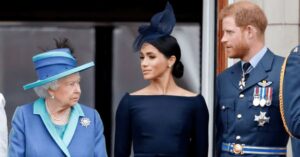
A Trailblazer from the Start: The Engagement and Wedding
Meghan’s journey as a royal rule-breaker began even before her marriage to Prince Harry.
During their engagement announcement in November 2017, she appeared without the nude stockings traditionally worn by royal women, opting for bare legs—a subtle but symbolic departure from the polished uniformity expected of the Firm.
This choice signaled her intent to blend modern style with royal duty, but it also set the stage for criticism from traditionalists who viewed it as a lack of respect for protocol.
The wedding itself on May 19, 2018, was a bold departure from royal norms.
Meghan walked partway down the aisle alone—a first for a royal bride—before being joined by Prince Charles, reflecting her independence and the absence of her estranged father, Thomas Markle.
The ceremony featured a gospel choir and an impassioned sermon by American Bishop Michael Curry, infusing the event with multicultural elements rarely seen in royal weddings.
The couple also opted for a lemon elderflower cake instead of the customary fruitcake, a seemingly minor choice that nonetheless underscored their willingness to defy convention.
Backfire: While these breaks were praised by some as a breath of fresh air, they alienated others who saw them as a rejection of British heritage.
The press began framing Meghan as an outsider unwilling to conform, a narrative that gained traction over time.
Her decision to forgo a traditional British designer for her Givenchy gown (designed by Clare Waight Keller, a Brit, but for a French house) further fueled debates about her commitment to royal customs, planting seeds of discontent early on.
Public Displays of Affection and Casual Style
Royal protocol, though unwritten, discourages public displays of affection (PDA) during official engagements, as royals are expected to maintain a professional demeanor.
Prince William and Kate Middleton adhere to this standard, rarely holding hands in public.
Meghan and Harry, however, frequently broke this norm, from hand-holding at the 2017 Invictus Games to affectionate gestures during their 2018 Australia tour.
Meghan’s fashion choices—ripped jeans at her first public outing with Harry, pantsuits instead of dresses, and dark nail polish at the 2018 British Fashion Awards—also flouted the expected sartorial restraint of royal women.
Backfire: These actions endeared Meghan to fans who admired her relatability, but they drew sharp criticism from traditionalists and the tabloid press.
Headlines accused her of disrespecting the monarchy’s dignity, with the Daily Mail and others branding her “pushy” or “ignorant of protocol.”
The dark nail polish incident, in particular, sparked a media frenzy, with outlets like CNBC calling it an “absolute no-no.”
This scrutiny amplified perceptions of Meghan as a disruptor, straining her relationship with the palace and fueling a narrative of incompatibility.
Christmas at Sandringham and Early Privileges.
In December 2017, before their marriage, Meghan joined the royal family for Christmas at Sandringham—an unprecedented privilege for a fiancée.
Royal tradition typically reserves this event for spouses, as seen when Kate Middleton was excluded until after her 2011 wedding to William. Harry reportedly appealed to Queen Elizabeth II to include Meghan, signaling her early integration into the family.
Backfire: While the Queen’s approval suggested acceptance, this move rankled some insiders and commentators who saw it as favoritism.
The press speculated about tensions with other royals, particularly Kate, whose adherence to protocol stood in contrast.
This exception set a precedent that Meghan was afforded special treatment, which later fed into accusations of entitlement when her relationship with the family soured.
Speaking Out: Feminism, Politics, and the Oprah Interview
Royals are expected to remain apolitical, a tradition Meghan challenged by openly identifying as a feminist and hinting at progressive views.
Before her marriage, she spoke about the #MeToo movement and women’s rights, and during a 2019 engagement, she accepted gifts—another protocol breach, as royals typically decline them to avoid favoritism.
The most seismic break came in March 2021, when Meghan and Harry sat for a tell-all interview with Oprah Winfrey after stepping back as senior royals.
Meghan discussed her mental health struggles, alleging a lack of support from the palace, and revealed a conversation about her unborn child’s skin color, implying racial bias within the family.
Backfire: The Oprah interview shattered the royal mantra of “never complain, never explain,” exposing internal conflicts to a global audience.
While it garnered sympathy from some, it enraged others, including parts of the British public and press, who accused Meghan of betraying the monarchy.
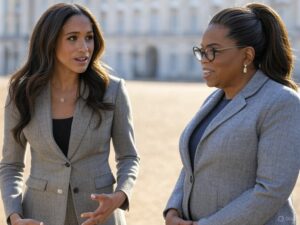
The skin color claim, though not directly attributed to racism by Harry, was spun as such by tabloids, deepening the rift with the royal family.
Reports from Hindustan Times in September 2024 suggest Meghan later regretted how her comments were received, believing they “backfired” by overshadowing her mental health narrative with controversy.
Royal biographer Angela Levin argued it was “too late” to mend the damage, reflecting the entrenched fallout.
Stepping Back and the Move to America.
In January 2020, Meghan and Harry announced their decision to step back as senior royals, seeking financial independence and a life split between the UK and North America.
Dubbed “Megxit,” this move defied the tradition of lifelong service to the Crown.
They later settled in California, launching Archewell and securing lucrative deals with Netflix and Spotify—ventures unthinkable for working royals.
Backfire: The departure stunned the royal family and public, with many viewing it as a rejection of duty.
The Queen’s reported displeasure and the stripping of their patronages underscored the institutional backlash.
In the US, initial goodwill faded as their Netflix series Harry & Meghan (December 2022) and Harry’s memoir Spare (January 2023) aired grievances, leading to a Newsweek-reported drop in American approval.
By March 2023, 45% of Americans supported stripping their titles, per YouGov, signaling a loss of public favor.
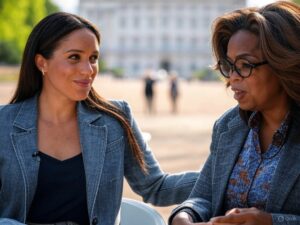
The couple’s brand, once tied to compassion, risked being overshadowed by perceptions of pettiness and privilege.
The Car Door Incident and Minor Missteps.
Even small actions drew outsized attention. In September 2018, during her first solo outing as a royal, Meghan closed her own car door—a task typically handled by staff.
While practical, it was seen as a breach of protocol, with etiquette experts like William Hanson noting it highlighted her outsider status.
Similarly, during a 2018 joint engagement with the Queen, Meghan entered a car before the monarch, prompting press claims of disrespect, though Harry later clarified in Spare that the coverage exaggerated the incident.
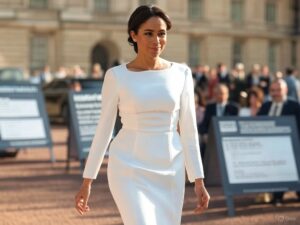
Backfire: These moments, though minor, fed into a broader narrative of Meghan as unprepared for royal life. The press seized on them to portray her as “uppity” or dismissive, amplifying public and palace frustration.
Over time, such incidents contributed to a perception that she couldn’t—or wouldn’t—adapt, straining her credibility within the institution.
Why It Backfired: Context and Consequences
Meghan’s breaks from tradition often stemmed from her American upbringing, Hollywood background, and desire for authenticity—qualities that clashed with the monarchy’s rigid expectations.
Her supporters argue she faced disproportionate criticism, tinged with racism and misogyny, as evidenced by the vitriol on X and in tabloids.
Vogue in 2022 called it “rampant discrimination,” noting double standards (e.g., Zara Tindall’s PDA went unremarked).
Yet, her critics contend she underestimated the cultural weight of royal customs, alienating those who valued them.
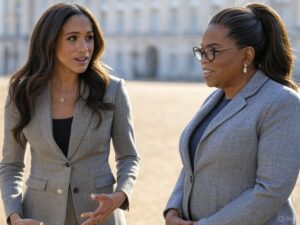
The backfire manifested in multiple ways:
Family Rift: The Oprah interview and subsequent projects irreparably damaged ties with the royal family, with no reconciliation in sight by March 2025.
Media Hostility: The British press, already skeptical, turned relentlessly negative, with Mirror UK in February 2025 citing palace insiders claiming Meghan saw royals as “babies” over protocol disputes.
Public Perception: Her approval ratings plummeted, with polls showing a shift from admiration to ridicule in both the UK and US.
Reflection: A Modern Royal Caught in Tradition’s Web
Meghan’s attempts to modernize the monarchy—through style, openness, and independence—were bold but fraught.
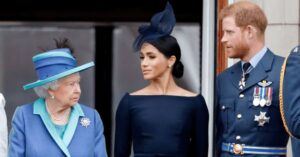
Some backfires were self-inflicted, like the Oprah interview’s fallout, while others stemmed from an unforgiving media and an institution resistant to change.
Reports of regret, such as those in Grazia Magazine, suggest she misjudged how her actions would be perceived.
Yet, the intensity of the backlash raises questions about whether the system was ever ready to accommodate her vision.
In the end, Meghan Markle’s story is one of ambition meeting tradition, with consequences that continue to unfold.
Whether her breaks were a necessary evolution or a misstep too far, they undeniably reshaped her royal legacy—for better or worse.












